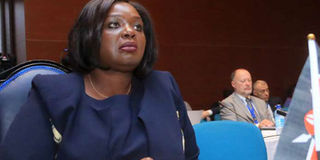Kenya yet to activate its rich space agenda

Defence Cabinet Secretary Raychelle Omamo attends the second International Space Forum at Ministerial Level - The African Chapter - at Radisson Blu Hotel, Nairobi, on February 13, 2018. Experts have said that Kenya stands to reap big from space technology. PHOTO | JEFF ANGOTE | NATION MEDIA GROUP
What you need to know:
- Dr Kimani said space technology can be used in helping meteorologists predict the weather.
- The Luigi Broglio Space Centre was built in the 1960s but has not been used to launch missiles for almost three decades.
President Uhuru Kenyatta’s March 2017 gazette notice establishing the Kenya Space Agency appeared to usher in a new era for Kenyan scientists, but little has happened since.
The agency was given an array of responsibilities that included co-ordinating space-related activities, recommending national space policies and establishing centres of excellence in space science.
But almost a year later, the President has not appointed a chairman of the board, meaning it cannot start operations.
And so when scientists from about 40 countries met in Nairobi for the International Space Forum on Tuesday, Defence Cabinet Secretary (CS) Raychelle Omamo could only enumerate the benefits the inchoate space centre will bring.
ELECTIONS
According to Dr John Kimani, the Kenya Space Agency lead scientist, there will be an operational body by June.
“Last year was a very busy year for the country. Most of the year was spent on electioneering.
"So, we were waiting for the political dust to settle down,” Dr Kimani, who was in charge of the National Space Secretariat that was disbanded to give way for the Kenya Space Agency, said.
He added that after Mr Kenyatta’s team of Cabinet Secretaries and Principal Secretaries is complete, there will be more focus on State corporations.
“After that, the Defence CS will also appoint three independent members of the board, in consultation with the Executive.
"Once we have that in place, then we will be ready to constitute and inaugurate the board. I can see that happening before June this year,” Dr Kimani said at his office at the Department of Defence headquarters.
AGRICULTURE
Dr Kimani, a trainer at the Kenya Defence Forces Technical College, foresees a transformed Kenya once the space agency is in place.
He noted that Kenya will focus on having satellites in the orbit that will help Kenyan authorities perform various applications.
The most immediate application to be launched, he said, will relate to agriculture.
“Using space technology, we will be able to advise farmers about their soils: what needs to be added to their soils.
"Instead of doing the manual soil analysis, using space you can tell the type of soils that we have, what needs to be added, what can best grow in such soil,” the 59-year-old PhD holder said.
SPECIALISTS
He added that the same technology can be used in helping meteorologists predict the weather, assist scientists to find underground and surface water, help in treating patients using technological innovations, assist in urban planning among other functions.
Ms Omamo, speaking at Tuesday’s event, was of the same opinion:
“Space technologies can provide effective solutions to the many problems of food security, provision of water and healthcare as well as job creation that African countries need.”
On matters space, there are few Kenyan specialists ready to further opportunities the government will provide, among them Dr Kimani, Prof Paul Baki of Technical University of Kenya (TUK) and Prof Hunja Waithaka.
SATELLITES
Prof Baki told the Sunday Nation that Kenya is a “sleeping giant” on matters space.
“We have not made use of our geographic location on the Equator; because this is the best place to launch satellites into space. You need minimum energy to send it there. If you’re off the equator, you must spend tonnes of fuel to put something into orbit,” he said.
“This is an area where the government needs to find a partner to work with. Launch of satellites is big business and that alone can help us rake in billions of shillings,” Prof Baki, 52, added.
The scientist said Kenya can take advantage of the Italy-owned Luigi Broglio Space Centre in Malindi.
The centre was built in the 1960s but has not been used to launch missiles for almost three decades.
BENEFITS
He said last year’s gazetting of the Kenya Space Agency was the finalisation of years of brainstorming on how Kenya would handle issues relating to space.
The same view is held by Dr Kimani.
“We tabled the Kenya Space Policy documents to the Cabinet for approval. We realised that if we went the route of the Bill in Parliament it would have taken longer. So, we converted the Bill into an executive order,” he said.
Prof Baki said if Kenya steps up its space programme, it stands to clinch various deals.
“Already, there are many interest groups wanting to do things with us as Kenyans. But without a properly functional agency, there is very little room for engagement,” he said.






